#monusco
Text
RDCongo - A GOMA (Nouvelles vidéos) : A l'Est du Congo, la population ne veut plus de la MONUSCO (ONU)
2 notes
·
View notes
Text
MONUSCO Blue Helmets leading the "TIGER PAW" military operation with support from the FARDC.

MONUSCO peacekeepers from Bangadlesh and Nepal launched a reconnaissance and offensive operation in Itur that included combat troops. Supported by intelligence, surveillance and reconnaissance drones, the operation was lead by the military commander of the Bangadleshi contingent of the UN and aimed at identifying and destroying the checkpoints controlled by militiamen from Codeco. The operation was conducted in collabortion with the Armed Forces of the Democratic Republic of the Congo (FARDC). The Operation ‘Tiger Paw’, launched mid-May, neutralized the armed group members and freed the areas of Bayoo and Drodo, in Djugu, in Ituri, neutralizing at least eight checkpoints and liberating an important axe connecting several villages. Common FARDC – MONUSCO effort to free the area; The operation ‘Tiger Paw’ was meticulously planned with the involvement of the FARDC, local authorities and affected population. On 21 May, FARDC members coordinated efforts with the peacekeepers and extended patrols were planned and carried out in the areas of Ivo Djugu, Lenga, Gali, Plateau Savo, Lida, Jippi and Pimbo. The village of Arr, known as the epicenter of insecurity in the areas, was subject to particular attention by the patrols. The aim was to map out the area before a robust intervention. The following day, four Congolese soldiers from the Masumbuko FARDC regiment joined the patrol and launched,from the Drodro base, an offensive to secure an axis including Drodro-Masumbuko-Uzi Hill-Tchoru village- and Pitso. The operation cleared the routes part of the axis of any presence of armed groups. The first illegal checkpoint was identified in the direction of Uzi hill, after a cordon and search operation had been carried out. It was subsequently destroyed. After clearing more than 1.5 km near Uzi hill, the patrol discovered and destroyed a second checkpoint and a third checkpoint manned by Codeco militiamen, who opened firebefore being shelled by mortar fire from the Blue Helmets. Having ascertained that there was no threat in the area, the patrol headed for the village of Tchoru, then on to Pitso, where it was joined by a Nepalese patrol. Between the villages of Tchoru and Pitso, the patrol destroyed five other unmanned Codeco checkpoints. The peacekeepers also organized a free medical campaign in the village of Tchoru, during which 120 patients, including 45 women and 45 children, received medical treatment. Medicines and medical kits were also handed over to the doctor in charge of the village health center.
#Armed Forces of the Democratic Republic of the Congo (FARDC)#monusco#blue helmets#peace operations#checkpoint#djugu#Operation ‘Tiger Paw’
0 notes
Text
As Relates to the Situation Concerning the Democratic Republic of the Congo, and the Conflict Which Has Persisted in the North Kivu from Certain Outside Actors in the Region
Kim Jong Un, and his flagrant, and willful flouting of international norms, and behaviors, must end.
His unfortunate triangulation of the Congolese Peoples, their prosperous land, with its abundance of resources, along with the Rwandan Military, must end
Kim Jong Un, and his flagrant, and willful flouting of international norms, and behaviors, must end.
His unfortunate triangulation of the Congolese Peoples, their prosperous land, with its abundance of resources, along with the Rwandan Military, must end.
His characteristic use of DRC assets, and government connections, which precede even the Mobutu Sese Seko Regime, are a tactic which he…
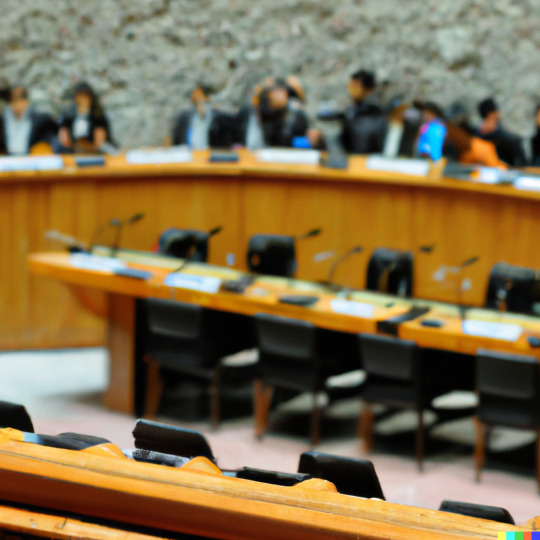
View On WordPress
#Democratic Republic of the Congo#Development and Investment#Diplomacy#internal security#MONUSCO#Paul Kagame#politics#PRC#Uganda#United Nations Mission#United States#Warlords
0 notes
Text
Qui a tué le 30/08/2023 à Goma ?
De notre groupe WhatsApp (Projet 2014)…
[4/9, 01:01] : POURQUOI CET HOMME DOIT ETRE ARRETE ET JUGÉ POUR LE MASSACRE DU 30 AOUT 2023?
Voici les raisons :
Nous sommes 03:20 de Goma, déjà, des militaires quitte le camps KATINDO en direction de Nyabushongo. Ils sont lourdement armés, telle une expédition qui va en guerre contre un ennemi armé et organisé.
A 04:15, les militaires ouvrent le feu…
View On WordPress
0 notes
Text
RDC : La MONUSCO se dit prête à accompagner Kinshasa pour des enquêtes conjointes sur l'assassinat de Chérubin Okende
Audrey Tolomokeni, stagiaire
Après une attente jugée longue par la famille politique du défunt député national Chérubin Okende, une réponse positive de la part de la mission onusienne est enfin tombée sur la table ministre de l’Intérieur.
“Nous avons répondu favorablement à la requête du ministre de l’Intérieur d’accompagner l’enquête sur le meurtre de Chérubin Okende et nous avons demandé au…
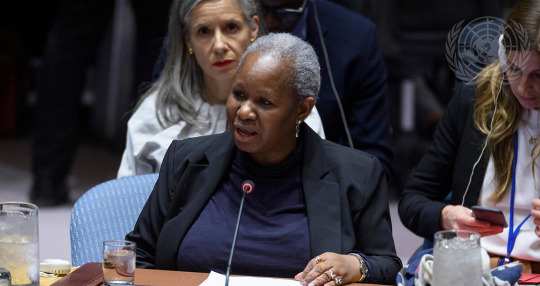
View On WordPress
0 notes
Text
Illustrate the importance of United Nations peace operations’ support to national justice and security institutions.
youtube
On 30 July 2010, armed members of the militia Nduma Défense of Congo (NDC) fanned out across 13 remote villages in restive, resource-rich Walikale, the largest territory in North Kivu, 150 kilometres west of the provincial capital of Goma.
Situated within a large equatorial forest, the area had been plagued by two decades of conflict, with myriad armed groups fighting to control lucrative mines, including those extracting tin’s primary mineral, cassiterite.
The then 34-year-old Mr. Sheka – a former miner who founded a year earlier what Goma’s chief military prosecutor called the area’s “most organized” armed group, complete with units, brigades, battalions, and companies – had given his orders.
For four days and nights, his recruits discharged them.
“Sheka wasn’t just anyone,” Nadine Sayiba Mpila, Public Prosecutor in Goma, told UN News. “Sheka committed crimes on a scale never seen in DR Congo.”
She described how his soldiers “would slaughter people and put the heads of these people on stakes and walk through the streets of the villages to say this is what awaits you if you don’t denounce what he called ‘the enemies’”.
By 2 August 2010, the armed militia had begun to fully occupy the villages.
Those who could, fled to safety. Some sought medical help from a nearby non-governmental organisation (NGO).
Within two weeks, the survivors’ stories had reached the authorities. Media reports headlined the attacks as “mass rapes”. The UN Mission in the country, MONUSCO, supported the deployment of a police contingent.
By November 2010, a case was brought against the warlord. Congolese authorities then issued a national arrest warrant for Mr. Sheka, and the UN Security Council added him to its sanctions list.
Mandated to protect civilians and support national authorities, MONUSCO launched Operation Silent Valley in early August 2011, helping residents to safely return to their villages.
Mr. Sheka was now a fugitive.
Also known as the Mai-Mai militia, NDC continued to operate in the area along with other armed groups.
“Cornered on all sides, he was now weakened, and had no choice but to surrender,” said Colonel Ndaka Mbwedi Hyppolite, Chief Prosecutor of the Operational Military Court of North Kivu, which tried Mr. Sheka’s case.
He turned himself in on 26 July 2017 to MONUSCO, who handed him over to Congolese authorities, which in turn charged him with war crimes, including murder, sexual slavery, recruitment of children, looting, and rape.
“The time had come to tell the truth and face the consequences of the truth,” Ms. Sayiba said.
Ahead of the trial, UN peacekeepers helped to build the detention cells that housed Mr. Sheka and the courtroom itself, where military court proceedings unfolded over two years, pausing from March to June 2020 due to the onset of the COVID-19 pandemic.
Starting in November 2018, the court would consider 3,000 pieces of evidence and hear from 178 witnesses at 108 hearings.
Their testimonies played a key role, representing the prosecution’s “last resort” to prove that crimes had been committed, said Patient Iraguha, Senior Legal Advisor for TRIAL International in DRC, who helped authorities with the case.
But, getting victims to testify was a serious challenge, the Congolese prosecutors said.
During the trial, Mr. Sheka had “reached out to certain victims to intimidate them”, jeopardizing their willingness to appear in court. However a joint effort involving the UN and such partners as TRIAL International changed that, Ms. Sayiba explained.
Colonel Ndaka agreed, adding that some rape victims also feared being stigmatised by society.
Protection measures were established, and judicial authorities were able to gather evidence in collaboration with MONUSCO, which also trained the judiciary in international criminal law procedures, giving the court sufficient knowledge to properly investigate the case, he said.
“When the Congolese authorities had to go into the field to investigate or to listen to the victims, they were surrounded by a MONUSCO contingent,” he said. “The victims who did appear, did so thanks to the support provided by our partners.”
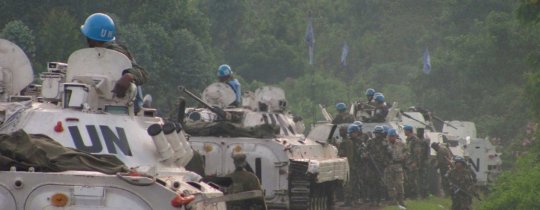
MONUSCO
UN peacekeepers in eastern DR Congo. (file)
Tonderai Chikuhwa, Chief of Staff at the UN Office of the Special Representative of the Secretary-General on Sexual Violence in Conflict, recalled hearing first-hand about the crimes.
“The harrowing testimonies I heard from survivors in 7 villages from Kibua to Mpofu in Walikale in 2010 are indelibly etched on my mind,” he wrote on social media at the time.
The first witnesses to appear in court were six children, with victims testifying through July 2020.
“After his testimony before the jury, Sheka started crying,” Ms. Sayiba recalled. “A defendant’s tears are a response. I believe Sheka realized that he was now alone. He had to take responsibility for his actions.”
The verdict: Congolese justice ‘did it’
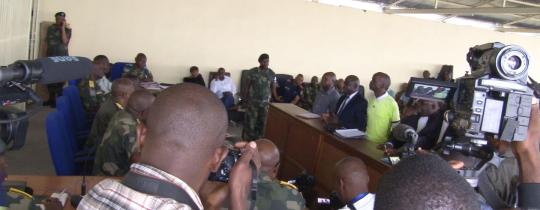
MONUSCO
The trial of Ntabo Ntaberi Sheka was held in Goma, DR Congo from 2018 to 2020. (file)
On 23 November 2020, the Operational Military Court sentenced Mr. Sheka to life in prison.
“This marks an important step forward in combating impunity for perpetrators of child recruitment and other grave violations,” the UN Secretary-General wrote about the case in his report on children and armed conflict in the DRC.
Ms. Sayiba said the sentencing sent “a great message” and “an assurance to the victims who could now see that their testimonies were not in vain”.
For Colonel Ndaka, the verdict was “a source of pride for myself, for my country, for Congolese justice”.
Today, the UN continues to support efforts to end impunity in the DRC, Central African Republic, Mali, South Sudan and other nations. In North Kivu, the Public Prosecutor’s Office expanded in June, with UN support, into the Peace Court of Goma.
Mr. Sheka, now 47, continues his life sentence in a facility in the capital, Kinshasa.
“The fact that Sheka was tried and sentenced is proof that the rule of law exists and that you cannot remain unpunished when you have committed the gravest, most abominable crimes,” Colonel Ndaka said. “Congolese justice could do it, with will, determination, and means. It was able to do it, and it did it.”
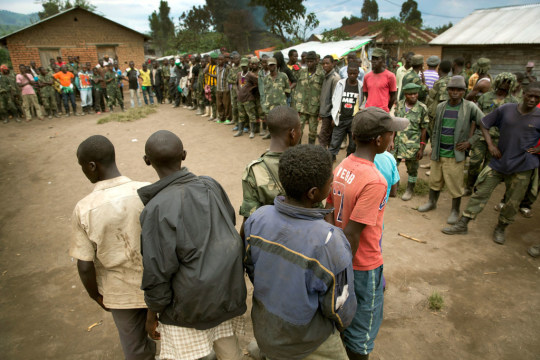
The United Nations Children’s Fund (UNICEF) and MONUSCO set apart demobilized child soldiers as the Mai-Mai militia surrenders itself to Congolese Government forces.
#Republic democratic of the Congo#Justice and Security#monusco#United Nations Children’s Fund (UNICEF)#Youtube
0 notes
Text
#PoliticoCD. | RDC : la Monusco note une amélioration de la situation des droits humains entre juin et septembre
#PoliticoCD. | RDC : la Monusco note une amélioration de la situation des droits humains entre juin et septembre
Dans un rapport adressé au Conseil de Sécurité de l’ONU, la Monusco note une nette amélioration de la situation des droits humains en RDC avec une réduction de 31%, soit 847 violations entre juin et septembre contre 1233 cas enregistrés en mars et avril.
Cependant, la Monusco a comptabilisé 428 exécutions extrajudiciaires et sommaires, parmi lesquelles 304 hommes, 71 femmes et 53 enfants. D’après…
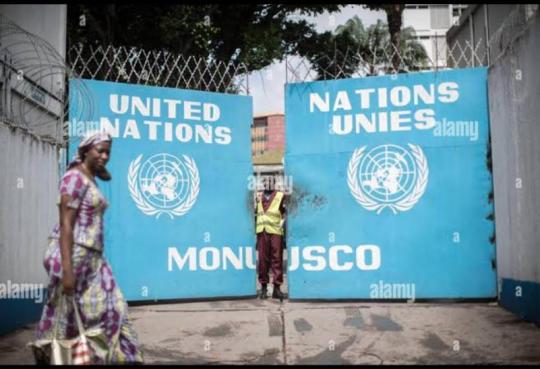
View On WordPress
0 notes
Text
Le Président Félix Tshisekedi a initié une réunion d'urgence a 19h00 au Palais de l'UA
Le Président Félix Tshisekedi a initié une réunion d’urgence a 19h00 au Palais de l’UA
À la suite des derniers événements survenus dans les villes de l’Est du pays, le président Félix Tshisekedi a présidé, à 19h00, à la cité de l’UA une importante réunion au format inter-institutionnel.
Suite aux derniers événements survenus à Butembo, Goma, et Kasindi, le Président Félix Tshisekedi a initié Lundi 01 Août 2022 à 19h00 une réunion qui a connu la participation du premier ministre…
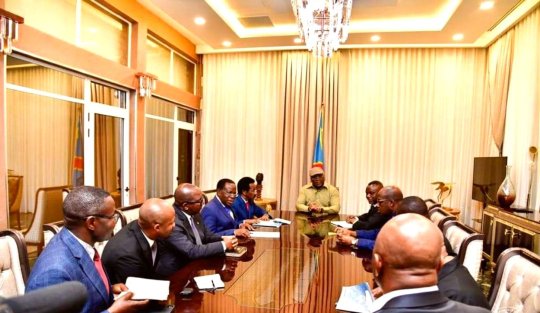
View On WordPress
0 notes
Link
0 notes
Text
313 Prajurit TNI AD Selesai Seleksi Recrutment Satgas Kizi TNI Konga XX-T Monusco /Kongo
313 Prajurit TNI AD Selesai Seleksi Recrutment Satgas Kizi TNI Konga XX-T Monusco /Kongo
313 Prajurit TNI AD Selesai Ikut Seleksi Recrutment Satgas Kizi TNI Konga XX-T Monusco /Kongo TA. 2022 (more…)
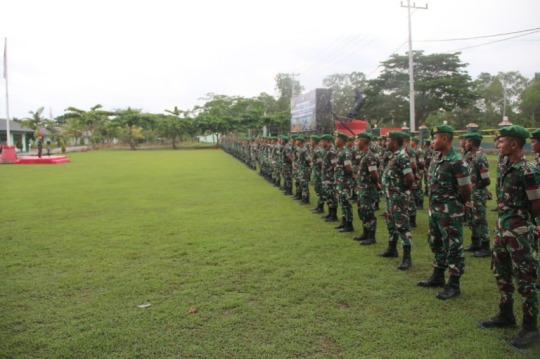
View On WordPress
0 notes
Text
RDC 🇨🇩 3 ème jour de protestation contre la présence de la force des nations-unies depuis 22 ans en RD Congo / images à Uvira au sud-Kivu où les manifestants se sont massés devant le camp de la MONUSCO
0 notes
Text
Wadan Satgas BGC TNI Konga XXXIX-D Monusco Hadiri Bangladesh Medal Award
Wadan Satgas BGC TNI Konga XXXIX-D Monusco Hadiri Bangladesh Medal Award
BUNIA | TRANSPUBLIK.co.id – Letkol Inf Ery Partahi H. Siregar beserta personel Perwira Satgas BGC TNI Konga XXXIX-D Monusco menghadiri Medal Award Bangladesh Air Force Contingent di lapangan upacara Ban Air Force Contingent, Bunia, Kongo, Kamis (6/10/2022).
Kegiatan tersebut merupakan upacara penyematan medali penghargaan dari Perserikatan Bangsa-Bangsa kepada setiap personel Peacekeepers…
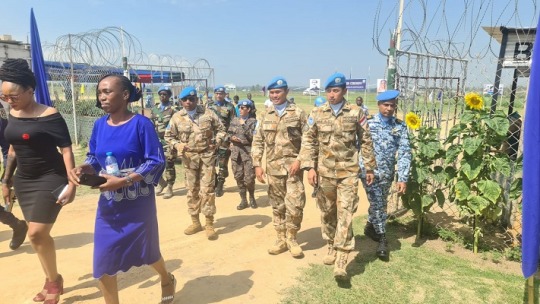
View On WordPress
0 notes
Text
(this article was published on Nov. 3, 2023. I highly recommend reading the whole thing to get a good overview of conflict in the DRC as of that date.)
Almost seven million people have been internally displaced in the Democratic Republic of Congo (DRC) — the highest number on record— amid an escalation of fighting in a war that has been ongoing for two decades.
The country’s eastern provinces have been the worst-affected following a resurgence of attacks by the M23 rebel militia, internationally acknowledged to be a proxy force backed by neighboring Rwanda, in 2021. The DRC currently also has over 100 armed groups operating within its territory.
In Masisi for instance, there has been a “worrying increase” in the cases of severe acute malnutrition, according to Doctors Without Borders (MSF). Reduced trade amid the ongoing conflict has also led to a major increase in food prices, with the cost of cassava flour rising by four times.
The ongoing fighting has also had a severe impact on the health and disease response, with the DRC reporting the highest number of suspected cholera cases and deaths in West and Central Africa region.
The country alone accounts for almost 80% of disease transmissions and approximately 60% of all deaths, as per a report released by UNICEF last month. The provinces of North and South Kivu alone accounted for 80% of all cases in the country and 33% of all deaths.
The current mandate of the EACRF is set to expire on December 8. Meanwhile, the DRC has also called for a removal of the UN peacekeeping force, MONUSCO, whose current mandate will expire on December 20, around the same time as the country is set to hold its elections.
The Congolese government has indicated that it wants the EACRF to withdraw from the country after its current mandate expires. On November 1, government spokesperson Patrick Muyaya said, “some Congolese are now questioning why we even asked to join the EAC […] When we joined the EAC, it was to connect our country with the region. The regional bloc was committed to peacebuilding but unfortunately, we have little progress.”
822 notes
·
View notes
Text
At first glance, the photo is an innocuous one: Taken on a sunny day in 2022, a cheerful group of twelve men and women are huddled together, posing for a selfie. They’re all dressed in military fatigues — their badges identify them as Egyptian, Indonesian and Bangladeshi officers. One man is wearing the light blue beret of a UN peacekeeper: The group has just finished their induction course for their stint at MONUSCO, the UN's mission in the Democratic Republic of Congo.
Innocuous, that is, but for a bald man with glasses in the center of the photo; his arm casually draped around the shoulder of an Indonesian officer. A military source shared the picture pulled from social media with DW, Sweden-based investigative outlet Netra News, and German newspaper Süddeutsche Zeitung.
Before the officer was deployed to the UN mission, he was deputy director of the Intelligence Wing of an elite force in Bangladesh: The Rapid Action Battalion, RAB.
The force, made up of Bangladesh’s police and military, was set up in 2004 with the support of the US and others to fight terrorism and violent crime. But its brutally efficient methods meant it was soon mired in accusations of wide-spread human rights violations, leading its former backer, the US, to impose sanctions on RAB in 2021.
In an investigation published last year, DW and Netra News revealed that RAB commits torture, murder, and abductions – and goes to great lengths to cover up its crimes. Its targets: alleged criminals, opposition activists, and human rights defenders.
Its members seemingly operate with complicity from the highest political level in Bangladesh, according to two whistleblowers. A claim the government rejected as "baseless and untrue."
RAB members sent to UN missions
A year after those revelations, DW, Netra News and Süddeutsche Zeitung can reveal that members of this infamous unit are seemingly being sent on peacekeeping missions: The deputy intelligence chief turned peacekeeper was not, we found, the only man who came from the group that several of our sources referred to as "death squad."
For months, DW and its partners conducted interviews with military and UN sources in Bangladesh and beyond; trawled through classified military files, deployment lists and painstakingly identified officers through Flickr, LinkedIn and Facebook.
One man's UN deployment was corroborated with the help of his daily running routes uploaded on a jogging app: for months, the avid jogger ran around Bangui, the capital of the Central African Republic, the seat of the UN's MINUSCA mission. In another picture, he posed for a selfie outside RAB's headquarters in Dhaka.
Two deputy heads of unit that runs torture cells among the peacekeepers
We found more than 100 RAB officers who went on peacekeeping missions, 40 of them within the last five years alone.
While we don’t have evidence that every single officer was implicated in crimes, at least three of them — Nayeem A., Hasan T. and Masud R. — worked for RAB's infamous Intelligence Wing, two as deputy directors. According to several sources, it is this unit that runs a secret network of torture cells across Bangladesh, some of them located in safe houses, others hidden deep inside RAB’s compounds. Survivors and military sources told DW and Netra News of beatings, mock executions, waterboarding and electric shocks.
"We have all the available tools," one former member of RAB explained. One particularly brutal method he witnessed was to place a detainee inside a container and heat it from below. "At some point the temperature is untenable," and the detainee, he said matter-of-factly, "would speak up."
The torture cells, another source said agreed, are "where they get information from civilians."
A source in RAB told DW, Netra News and Süddeutsche Zeitung that both of the two deputy directors were implicated in crimes, such as torture and executions.
While the claim cannot be corroborated independently, several other sources confirmed that it was likely that deputy directors with command responsibility would have signed off on what was happening in the torture cells, or at the very least known what was happening.
And yet, they were later tasked, as peacekeepers, to protect vulnerable civilian communities. The idea of peacekeeping was born after the Second World War: a force at the behest of the international community made up of soldiers and police officers drawn from the UN's member states, sent by the Security Council when governments fail and countries descend into turmoil.
Currently, tens of thousands of peacekeepers are deployed globally, in conflicts and crises ranging from the Democratic Republic of Congo, South Sudan and the Central African Republic to Kosovo and Kashmir.
Despite these lofty ideals, peacekeeping operations, individual soldiers and entire contingents have over the years been embroiled in scandals, which the UN has always been swift to condemn. Critics say peacekeeping missions have been ineffective, while those defending peacekeeping say they have saved countless lives.
In 2012, after several sexual abuse scandals by peacekeepers made headlines, most notably of children in Haiti, the UN implemented a new human rights policy for its personnel.
Up to 'abusive government' to vet peacekeepers
While troop contributing countries generally continue to select and vet the military personnel they send to missions with the exception of Force Commanders and their deputies, they now have to attest for each soldier that they have not committed or are alleged to have committed any human rights violations.
In the case of Bangladesh, that means that "they are asking an abusive government to then decide which officers are abusive or not," Meenakshi Ganguly, deputy director for South Asia at Human Rights Watch said in a phone call.
Bangladesh's government, Ganguly explained, "does not seem to believe that people that commit human rights violations need to be prosecuted and held to account.” Indeed, few members of RAB have ever been prosecuted.
And that is why she, together with several other human rights organizations, both Bangladeshi and international, has long called for RAB to be banned entirely from peacekeeping operations.
They are not the only ones to sound a warning: In August 2019, the Committee against Torture, a UN body made up of independent experts that monitor human rights in UN member states, published its report on Bangladesh.
Its authors voiced concern at "numerous reports" of cases in which members of RAB "have been credibly alleged to have committed torture, arbitrary arrests, unacknowledged detention, disappearances and extrajudicial killings of persons in their custody.
'Grave concern'
One of the report's authors is Jens Modvig, a medical doctor who runs Dignity, the Danish Institute Against Torture, an NGO housed in an unassuming office block in Copenhagen.
While making coffee in the organization's small kitchen, he recalled the experts’ "grave concern" at the reports of human rights abuses by Bangladesh's security forces. It was a term, he said, they had "not used lightly."
The Committee's recommendations, Modvig said, "was that former and current members of RAB should not be allowed to do service in peacekeeping operations."
And yet, our investigation shows nothing happened.
DW, Netra News and Süddeutsche Zeitung sent several requests for an on-camera interview to the UN Department of Peacekeeping Operations. They were declined.
Instead, the UN agreed to respond in writing to the findings: "We do not have", a spokesperson wrote, "the resources to screen each and every person and have a long-standing policy that places specific responsibility on troop and police contributing countries."
In the case of Bangladesh, the spokesman went on, UN Peacekeeping "has continuously engaged bilaterally with national authorities to convey concerns about serious allegations of human rights violations by defense and security forces, in particular by members of RAB".
UN susceptible to blackmail?
We did eventually find one man willing to go on-the-record: Andrew Gilmour, a former UN Assistant Secretary-General for Human Rights. Today, he heads the Berghof Foundation in Berlin that advocates for global peace: a-long-time UN diplomat, who, he said, picks his jackets according to an interview’s topic and mood.
For a story about peacekeeping and human rights abuses, he donned a somber blue.
If he was still in the UN, he said, "I probably wouldn't be able to be this frank and to say we get some really pretty useless troops and some pretty brutal ones as well."
Bangladesh, he concluded, was far from a unique case: "It is not the first time that member states have put forward people with bad human rights records to serve in their battalions that they assign to the UN." At times, he said, "it can be entire contingents that were implicated in some action, repressing people in their own country, for example, and other times it is individuals."
He stressed repeatedly that the UN was doing its best to prevent that from happening.
But he conceded, if the UN pushed countries too hard, there was a risk they might threaten to pull out their troops entirely. It was "pretty hard to do something about if the government of that member state is insisting on putting forward a contingent or an individual."
In one case, he recalled, "one country that was really important in contributing troops to a number of peacekeeping operations literally said, OK, we're going to pull out all together." And so, he explained, the UN's Secretary General at the time "had to basically go to that country and essentially apologize to the head of state."
Otherwise, four UN peacekeeping operations would have collapsed, Gilmour said.
His testimony seemed to point to one thing: that when it comes to peacekeepers, the UN is seemingly susceptible to blackmail.
A UN source agreed: at even the slightest hint of criticism, officials in Bangladesh — one the UN’s major troop contributors — threatened to withdraw their troops. As of March of this year, about 6,000 Bangladeshi peacekeepers were actively deployed worldwide.
It's unclear, however, whether Bangladesh would actually go through with this threat and thus lose access to UN missions, which are lucrative both for individual soldiers and the countries deploying them.
According to government officials, Bangladesh has received more than 2.5 billion USD over the past 23 years. Individual peacekeepers receive a higher salary than they would back home.
The spokesperson for UN Peacekeeping rejected the claim that the UN is seemingly powerless when faced with threats: "The largest troop contributor at the moment contributes less than 10% of the 65,000 personnel deployed. Therefore, no single troop contributor can credibly threaten to undermine the viability of a peacekeeping operation by withdrawing all of their forces".
UN's hands seemingly tied
There is a reason why, according to Gilmour, the UN's hands are seemingly tied. When he was "very, very young," the majority of UN peacekeepers came from places like Sweden and Ireland, he explained.
But over the years, as the Cold War drew to a close in the early 1990s, faced with deadlier missions, Western governments increasingly started to pull their troops out of peacekeeping operations, preferring to pay for them instead.
Democratic governments had to weigh whether they could pay a certain blood toll, according to a political source from a western European country with inside knowledge of the workings of the UN. If soldiers deployed to UN missions returned in body bags, he explained, their governments could soon have a parliamentary inquiry on their hands.
That, he added, was not a problem countries like Bangladesh had to deal with. At the same time, he conceded that UN peacekeeping missions were lucrative for both individual soldiers and governments to fill their coffers.
12 notes
·
View notes
Text
Les ituriens croient à nos ennemis : Kinshasa et la MONUSCO !
[16/7, 10:19] G. Paluku Atoka Uwekomu: C’est la catastrophe !Cette fois, je vois mon pays occupé, recolonisé.Dommage que les ituriens acceptent, tolèrent ces macabres visiteurs que Kinshasa invite chez nous.L’avenir nous dira qui mourra et pourquoi.En effet, le conflit dit hema/lendu tout comme l’invasion du pays par des bandits étrangers ne peuvent correctement être résolus de cette…
View On WordPress
0 notes
Text
Congolese Man Self-Immolates to Highlight Overlooked Genocide in Congo
A video of a Congolese man who set himself on fire to protest the ongoing genocide in the Democratic Republic of Congo (DRC) has gone viral on social media, sparking outrage and sympathy from viewers around the world.
The video, which was posted on Twitter on November 8, shows the man, who has not been identified, standing in front of a crowd in Kinshasa, the capital of the DRC, holding a sign that reads “Stop the genocide in Congo”.
He then pours gasoline over his body and lights a match, engulfing himself in flames. The crowd screams and tries to help him, but he pushes them away and falls to the ground.
The video ends with the man lying motionless on the pavement, surrounded by smoke and fire.
The man’s condition and fate are unknown, as well as his motives and background.
A brutal conflict
The man’s self-immolation is a desperate attempt to draw attention to the genocide that has been taking place in the eastern provinces of the DRC for more than two decades, claiming millions of lives and displacing millions more.
The conflict in the DRC is fueled by the competition for the rich natural resources of the region, such as gold, coltan, and cobalt, which are used in various industries and technologies.
The region is controlled by dozens of armed groups, some of whom are backed by neighboring countries, such as Rwanda and Uganda, who seek to exploit the resources and influence the politics of the DRC.
The armed groups terrorize the civilian population, committing atrocities such as rape, murder, looting, and kidnapping. They also recruit child soldiers and force people to work in the mines under harsh conditions.
The conflict has also caused a humanitarian crisis, as the DRC’s infrastructure, health-care system, and economy have collapsed, leaving millions of people in need of food, water, medicine, and shelter.
According to the International Organization for Migration (IOM), the DRC has the largest number of internally displaced people in the world, with 6.9 million people uprooted by the violence as of October 2023.
The IOM said that the conflict has worsened in recent months, with more people displaced in less time than ever before.
A failed intervention
The international community has tried to intervene in the DRC’s conflict, but with little success and much controversy.
The United Nations has deployed a peacekeeping mission in the DRC since 1999, with the mandate to protect civilians and support the political process.
However, the mission, known as MONUSCO, has been criticized for being ineffective, corrupt, and abusive. It has also faced resistance and hostility from the Congolese government and some of the armed groups.
Earlier this month, the Congolese government ordered the East African regional force, which was deployed in 2022 to help MONUSCO fight the armed groups, to leave the country by December, accusing it of failing to deliver results.
The UN has also imposed sanctions and an arms embargo on some of the parties involved in the conflict, but these measures have been violated and evaded by various actors.
The UN has also supported the efforts to bring justice and accountability to the perpetrators of the genocide, but these efforts have been hampered by the lack of cooperation and security in the region.
A call for action
The video of the man who set himself on fire has sparked a call for action from various groups and individuals, who have expressed their solidarity and support for the Congolese people.
Some have called for a boycott of the products that use the resources from the DRC, such as smartphones, laptops, and electric cars, to pressure the companies and governments that benefit from the exploitation of the region.
Some have also called for a stronger and more effective intervention from the international community, such as a diplomatic and humanitarian initiative to end the conflict and address the root causes of the violence.
Some have also called for a recognition and a commemoration of the genocide, as well as a compensation and a reconciliation for the victims and the survivors.
The video of the man who set himself on fire has also raised awareness and compassion for the plight of the Congolese people, who have suffered and endured one of the worst tragedies in human history.
6 notes
·
View notes